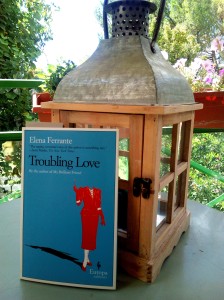translated by Ann Goldstein.
Elena Ferrante’s debut novel was first published in Italy in 1991, translated into English in 2016. It became a literary sensation and earned its author the Elsa Morante prize, one of Italy’s most prestigious awards for literature.
A Drowning at Sea

Photo by Bekir Du00f6nmez on Pexels.com
Troubling.
A daughter Delia is concerned after a telephone call from her mother. Following her subsequent disappearance and death, she returns to her mother’s empty apartment, trying to retrace her steps to understand what had been going on in her life that lead to her abrupt departure. Her frustration with her mother is apparent from the first page.
Her sociability irritated me: she went shopping and got to know shopkeepers with whom in ten years I had exchanged no more than a word or two; she took walks through the city with casual acquaintances; she became a friend of my friends, and told them stories of her life, the same ones over and over. I, with her, could only be self-contained and insincere.
Strange things happen, some of which a neighbour helps explain, a woman who opens her door ajar at the slightest noise, thus aware of her mother’s visitors. Yet Delia doesn’t act rationally herself, she’s not the most reliable narrator and there is a sense of confusion and danger as we follow her reckless pursuit of clues across town and memories of the past emerge.
The Abusive, Possessive Artist

Photo by cottonbro on Pexels.com
Nearly every past relationship recounted is troubled, she and her sisters lived in fear of their father all their childhood, often watching him beat their mother in fits of irrational jealousy, blaming her should any man glance her way, yet he’d spent his days painting images of her naked body on canvas, selling them to anyone who’d pay.
During adolescence I saw those figures of a woman leave the house in the hands of strangers who were not sparing in their crude comments. I didn’t understand and perhaps there was nothing to understand. How was it possible that my father could hand over, to vulgar men, bold and seductive versions of that body which if necessary he would defend with a murderous rage?
Amalia spent her marriage suppressing her natural gaiety and charm, her daughter learned of the danger, developing an instinct for it.
When we went to the movies without him, my mother didn’t respect any of the rules that he imposed: she looked around freely, she laughed as she wasn’t supposed to laugh, and chatted with people she didn’t know. So when my father was there I couldn’t follow the story of the film. I glanced around furtively in the darkness to exercise, in my turn, control over Amalia, to anticipate the discovery of her secrets, to keep him, too, from discovering her guilt.
Much of the novel is narrated through the gaze of others, adding to the awkward, vulnerable, exposed feeling of the women. It’s a narrative of deep unease, both in the present day and in its long reach back to the first encounter between the young Amalia and her future possessive husband.
A Free Spirit Escapes
Her mother couldn’t be contained, she was an enigma to Delia, raised in that fearsome household, exposed to it from a very young age, conditioned by it, fear and judgement had become a natural part of her psyche.
I realised I was summarising a woman without prudence and without the virtue of fear. I had memories of it. Even when my father raised his fists and struck her, to shape her like a stone or a log, she widened her eyes not in fear but in astonishment.
Her mother used to sew, her world was measurements and fittings and bodies. Garments play a part in the story, again, a mystery to Delia to unravel and try to understand, as if they too might be a clue to her disappearance.
For all the days of her life she had reduced the uneasiness of bodies to paper and fabric, and perhaps it had become a habit, and so, out of habit, she tacitly rethought what was out of proportion, giving it the proper measure.
As she follows random leads, trying to reconstruct her mother’s movements, she revisits scenes from childhood, drawing a picture of her mother, a vivacious woman full of life, spilling outside the restrained bindings of an oppressive marriage and tries to reconstruct the latter part of her life that she’d lived out separate from her family, though still perceived by her daughter and ex-husband as being in secret.
Maybe in the end all that mattered of these two days without respite was the transplanting of the story from one head to the other, like a healthy organ that my mother had given up to me out of affection.
I was reminded of the experience of reading The Days of Abandonment, there is an intensity to the narrative, its visceral descriptions, evoking reactions, everything feels up close and confronting, we are passengers in the seat of a mind slightly out of control, where new thoughts send the protagonist out in pursuit of the elusive and we must accompany her, reassured by moments of clarity and spun out by acts of recklessness.
 That’s Ferrante.
That’s Ferrante.
She has a new book due out in September The Lying Life of Adults said to have the same additive, page-turning qualities of her earlier novels.
Ferrante follows Giovanna’s life from age 12 to 16, charting her development from the sweet girl who adores her parents to a sulking, aggressive teenager who finds pleasure in self-abasement and making those around her uncomfortable. The premise is a fertile one for the author, an expert chronicler of adolescence and its many indignities, as well as its erratic, overwhelming passions.
Kathryn Bromwich The Guardian
Further Reading
My Review of other Elena Ferrante titles:
My Brilliant Friend, The Story of a New Name, Those Who Leave & Those Who Stay, The Story of the Lost Child
Frantamuglia (non-fiction)
The Guardian: Review: The Lying Life of Adults – a rebel rich girl comes of age by Kathryn Bromwich – Italians who queued up into the night for the reclusive writer’s new tale of painful adolescence won’t be disappointed


I have to admit, I haven’t picked up any Elena Ferrante yet, but this one quite appeals, especially the character of the mother.
LikeLike
Most of us heard of Ferrante as the tetralogy was being finished, I have enjoyed going back to read her earlier work, Days of Abandonment was all-consuming and intense, it carries the reader along with it.
LikeLike
This sounds a better bet than My Brilliant Friend et al, which I read, and enjoyed, but wasn’t sucked into as so many readers seem to have been.
LikeLike
When I look back having read them all, I think that the first book in the series is the one that shows most of the characteristics of what she brings to the novel. And perhaps because for most of us that was our first encounter with her style of writing. Her novellas have been great to read slowly over time, a dissection of a short period in a woman’s life, usually after some life changing event.
LikeLiked by 1 person
I’ve read a few of Ferrante’s but then I got sick of the fervour with which she writes. Now, after a break, I think I might like to try this one.
Thanks for an enticing review.
LikeLiked by 1 person
I know what you mean, they require distance between to fully appreciate, over indulging could lead to literary indigestion. Which I think happened with the series.
LikeLike
I love the sound of this. I read The Days of Abandonment and the quartet – but never managed to get round to this one. I love stories that explore these kinds of relationships, delving into the past to uncover truths. Ferrante’s new novel also sounds very tempting. I do have a book of short essay pieces by her on my TBR that I am reminded I should get around to soon.
LikeLiked by 1 person
I’m looking forward to the new book as well, I do like the way all these shorter books are like a jigsaw of a woman’s formative experiences and how they affect her in the present, without that ever being so obviously said.
LikeLike
Oddly enough, I ended up putting this book aside when I tried to read it a few years ago — probably because it was too soon after I had read The Days of Abandoment, with which it shares a somewhat claustrophobic sense of intensity. Hopefully, I’ll be able to go back to it at some point, maybe once the current crisis settles down (if that’s not too unrealistic a dream). It sounds like an intriguing, questioning exploration of family, very in line with Ferrante’s characteristic style.
LikeLiked by 1 person
I don’t think those two can be read too close to each other, and funnily enough that sense you had which reminded me of reading Days of Abandonment as well, I just revisited today looking at my review of Frantumaglia, the first half of which is about those two novels and she says: “Troubling Love and Days of Abandonment seemed to me the ones that most decisively stuck a finger in certain wounds I have that are still infected, and did so without keeping a safe distance. At other times I’ve written about clean or happily healed wounds with the obligatory detachment and the right words. But then I discovered this is not my path.”
LikeLike
Pingback: Elena Ferrante Shares 40 Favourite Books by Female Authors – Word by Word
Pingback: The Lying Life of Adults by Elena Ferrante translated Ann Goldstein – Word by Word
Pingback: Best Reads of 2020 – Word by Word
Pingback: The Lost Daughter by Elena Ferrante tr. Ann Goldstein – Word by Word